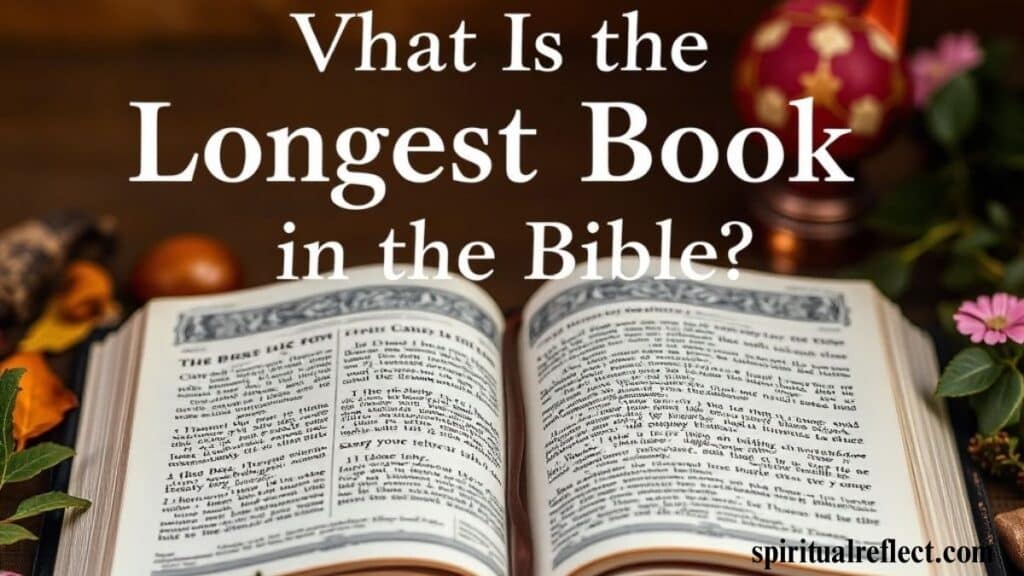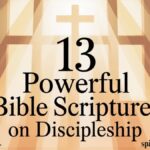The phrase What Is the Longest Book in the Bible? refers to identifying which book within the Bible contains the most chapters, verses, or words. The answer lies in the Book of Psalms, a collection of 150 poetic chapters filled with prayers, songs, and reflections. The Psalms is unique because it is not just one continuous story but a diverse anthology expressing a wide range of human emotions and spiritual truths.
Imagine a book that holds the voices of kings, priests, and everyday people speaking directly to God through joy, sorrow, hope, and praise. This book has shaped worship practices for thousands of years and continues to inspire millions worldwide. The Book of Psalms serves as both a spiritual guide and a heartfelt expression of faith, making it a timeless treasure in biblical literature.
Beyond its length, the Book of Psalms offers rich lessons about faith, trust, and human experience. Its verses teach how to seek comfort in difficult times and celebrate blessings in moments of joy. For anyone curious about biblical wisdom and heartfelt prayer, Psalms is the answer to What Is the Longest Book in the Bible? that truly speaks to the heart.
Identifying the Longest Book in the Bible: Psalms
When people ask, “What is the longest book in the Bible?” it’s important to understand how length is measured. Is it by the number of chapters? Verses? Words?
- Chapters: The Book of Psalms contains 150 chapters, far surpassing most other books in the Bible.
- Verses: Psalms have approximately 2,461 verses, making it the Bible’s lengthiest book by verse count.
- Words: While the exact word count varies by translation, Psalms consistently rank as the longest in most major versions, including the King James Version and New International Version.
For comparison:
| Book | Chapters | Verses | Primary Author(s) | Key Themes |
|---|---|---|---|---|
| Psalms | 150 | 2,461 | King David, others | Worship, praise, lamentation |
| Isaiah | 66 | ~1,292 | Isaiah | Prophecy, salvation |
| Jeremiah | 52 | ~1,364 | Jeremiah | Judgment, hope |
| Genesis | 50 | ~1,533 | Moses (traditionally) | Creation, beginnings |
Though books like Genesis and Isaiah have significant length and impact, none approach the sheer scale of Psalms. Its unique structure as a collection of individual songs, prayers, and poems gives it both breadth and depth.
Why are Psalms So Long?
What makes the Book of Psalms so long? The answer lies in its origin and composition.
- A Collection Over Time: Psalms is a compilation of 150 separate psalms written over centuries. These songs were used in different contexts—temple worship, personal prayer, and national lament.
- Multiple Authors: While King David is the most famous, numerous authors contributed to the Psalms, including Asaph, the Sons of Korah, Solomon, and others. This diversity added layers of style, perspective, and emotion.
- Wide Range of Themes: Psalms cover a vast emotional and spiritual landscape—joy, sorrow, praise, repentance, fear, hope, trust, and divine law. This variety naturally increases its length.
- Liturgical Role: Many psalms were meant for public worship and ritual, including festivals and sacrifices, so they had to be comprehensive enough to serve various religious needs.
In short, the Book of Psalms grew organically as a spiritual anthology, reflecting human experiences and divine worship. Its length reflects its richness.
Spotlight on Psalm 119: The Longest Chapter in the Bible
No discussion about the longest book would be complete without highlighting Psalm 119—the longest chapter in the Bible.
- Length and Structure: Psalm 119 has 176 verses. It’s structured as an acrostic poem using the 22 letters of the Hebrew alphabet. Each stanza contains eight verses beginning with the same Hebrew letter.
- Themes: This chapter focuses on God’s law, commandments, and statutes. It emphasizes a deep love and devotion to God’s Word and the desire to live by His guidance.
- Famous Verse: One of the most quoted verses is Psalm 119:105 — “Your word is a lamp to my feet and a light to my path.” This verse beautifully captures the theme of divine guidance.
- Literary Masterpiece: The chapter’s intricate poetic form demonstrates the importance of memorizing and meditating on Scripture in ancient Jewish worship.
Psalm 119 isn’t just long; it’s a profound reflection on God’s laws and commandments as the foundation for spiritual life and trust.
Authorship of Psalms: Who Wrote the Longest Book?
The authors of Psalms form a fascinating mosaic of ancient Israel’s spiritual leaders and poets.
- King David: Traditionally credited with writing about half of the psalms. His psalms express a wide range of emotions—from triumphant praise to desperate pleas.
- Asaph: A prominent Levite singer and seer who contributed several psalms.
- Sons of Korah: A group of temple singers responsible for many psalms characterized by worship and communal lament.
- Solomon, Moses, Ethan: Other authors credited with specific psalms.
- Anonymous: Many psalms remain unattributed, showing the collective nature of this work.
Each author’s unique background influenced the emotional expression in worship found in the psalms. This diversity helps explain the rich literary and spiritual texture of the book.
Key Themes and Lessons from Psalms
The Book of Psalms offers timeless lessons and themes that resonate deeply with readers of all backgrounds. Here are some of the core ideas:
- Praise and Worship: Many psalms are songs of adoration celebrating God’s greatness, power, and mercy.
- Lament and Sorrow: Expressing pain, grief, and struggle, these psalms teach us to bring our honest feelings to God.
- Thanksgiving: Gratitude for God’s deliverance and blessings appears repeatedly.
- Faith and Trust: Psalms encourage unwavering trust in God, even in trials.
- Repentance: Several psalms model heartfelt confession and seeking forgiveness.
- Divine Law: Psalm 119 especially highlights the importance of God’s commandments as a moral compass.
This emotional breadth allows readers to connect on a personal level. The emotions in the Psalms make it a spiritual mirror reflecting human experiences.
The Relevance of Psalms in Modern Life
Why does the longest book in the Bible still matter today? Its relevance is powerful and practical.
- Prayer and Meditation: Psalms serve as a guide for personal prayer, offering words when emotions run deep and when faith feels fragile.
- Comfort in Hardship: Verses from Psalms often bring solace in grief, anxiety, and confusion. For example, Psalm 23’s “The Lord is my shepherd…” is a universal comfort.
- Worship and Music: The psalms inspire countless hymns, contemporary worship songs, and liturgies. They connect ancient tradition with modern faith.
- Spiritual Growth: By meditating on Psalms, believers deepen their relationship with God and gain moral guidance.
- Scripture Memorization: The poetic structure and repeated themes make the Psalms ideal for learning God’s Word by heart.
Many people find that the Book of Psalms brings spiritual encouragement and divine worship into everyday life, helping them navigate challenges with hope and trust.
Additional Interesting Facts About Psalms
- Musical Origins: Originally, many psalms were paired with specific instruments or musical styles in temple worship.
- Influence on Culture: Psalms have inspired works of art, literature, and music across centuries. They appear in famous pieces like Handel’s Messiah and modern Christian music.
- Interfaith Significance: Psalms hold a special place not only in Christianity but also in Judaism and Islam, showing their broad spiritual impact.
- Psalm 23’s Popularity: Known as the “Shepherd Psalm,” it’s among the most memorized and recited texts worldwide.
Summary Table: Quick Facts About Psalms vs. Other Long Bible Books
| Book | Chapters | Verses | Primary Author(s) | Key Themes |
|---|---|---|---|---|
| Psalms | 150 | 2,461 | King David, Asaph, Korah, others | Worship, praise, lament |
| Isaiah | 66 | ~1,292 | Isaiah | Prophecy, salvation |
| Jeremiah | 52 | ~1,364 | Jeremiah | Judgment, hope |
| Genesis | 50 | ~1,533 | Moses (traditionally) | Creation, beginnings |
Conclusion
So, What Is the Longest Book in the Bible? It is the Book of Psalms. With 150 chapters and over 2,400 verses, the Psalms stand out as the longest. It contains songs, prayers, and poems written by King David and others. These writings show many feelings like joy, sadness, hope, and trust. Because of this, the Psalms help people connect deeply with God.
If you ask again, What is the Longest Book in the Bible? Remember it is more than just its length. Psalms teach us about worship, prayer, and God’s laws. It offers comfort during hard times and guides us in faith. Reading Psalms can bring peace and strength to anyone, no matter their journey. It remains a powerful part of the Bible that speaks to all generations.
FAQs
Q1: What is the longest book in the Bible by chapters?
The Book of Psalms is the longest, containing 150 chapters.
Q2: Which chapter is the longest in the Bible?
Psalm 119 is the longest chapter with 176 verses.
Q3: Who wrote most of the Psalms?
King David is traditionally credited with writing about half of the Psalms.
Q4: Why is the Book of Psalms so important in worship?
It provides prayers and songs that express deep emotions, used in worship across many faiths.
Q5: Is Psalms the longest book by word count, too?
Yes, Psalms is generally the longest by chapters, verses, and word count in most Bible versions.

Rana Ahmad is the creator of Spiritual Reflect, where she shares insights on personal growth, mindfulness, and meaningful living to inspire a more intentional life.







